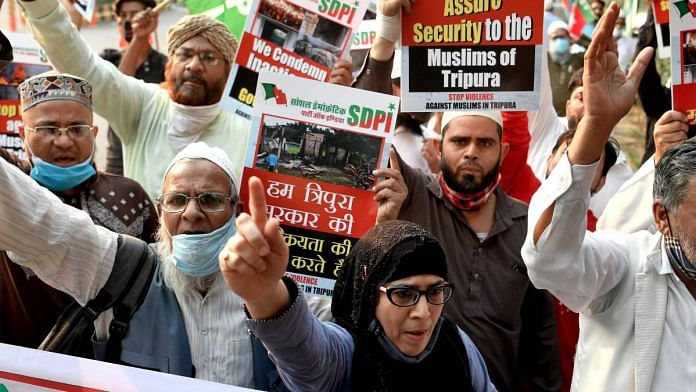Bengaluru: The Social Democratic Party of India (SDPI) announced Saturday said that it will contest from at least 100 constituencies in the upcoming Karnataka assembly elections — a development that political experts say could split minority votes and ultimately help the Bharatiya Janata Party.
SDPI is the political arm of the outlawed Popular Front of India, which the Modi government banned last September.
“We will contest as an alternative political system…party…in these elections,” M.K. Faizy, the national president of the SDPI, said in Bengaluru as the party announced candidates in Bengaluru, Dakshina Kannada, Mysuru, Udupi, Chitradurga, and other districts in the first list.
As SDPI gears up for elections for the 224-member assembly that will be held later this year, the Congress and the BJP accuse one another of providing patronage to the party. While the Congress accuses the BJP of propping up the SDPI to help split votes, the ruling party accuses the former of using SDPI for its appeasement politics.
“They (SDPI) are nothing but the ‘B’ team of the BJP as suggested by an RSS functionary, Satyajit Surathkal, itself. He said that the BJP tactically supports them and funds them (SDPI). He (Surathkal) says that they (SDPI) are there only to split votes, defeat the Congress, and are backed by the BJP. What more do we have to say on this?” Priyank Kharge, Congress legislator and Karnataka Congress’s communications chief, told The Print.
He was referring to former BJP leader Surathkal’s allegations in July last year that the party was funding the SDFI.
The BJP leaders deny these allegations, claiming instead that it’s the Congress that has an “understanding” with the SDPI.
“They (SDPI) are a political party and want to contest polls and we have no connection with them. They usually broker an understanding with the Congress and contest. We (BJP) are not even dependent on their (minority) votes and have a strong base ourselves,” Udipi’s BJP legislator Raghupathi Bhat told ThePrint.
Political observers say SDPI’s entry will not just split the votes of minorities in the state but will also give the ruling party Bharatiya Janata Party an opportunity to aggressively pursue the Hindutva card — as it has been doing under Chief Minister Basavaraj Bommai.
“They (SDPI) will play the usual role of splitting the votes,” A. Narayana, a Bengaluru-based political analyst and a faculty member at the Azim Premji University told ThePrint. “But in case Muslims feel that they won’t let it happen because they are feeling more insecure than ever before, we’ll have to see if that strategy works.
Also Read: Vokkaliga leaders demand 12% reservation as quota stir intensifies in poll-bound Karnataka
Polarising issues, weakening Congress gives it a chance
This isn’t SDPI’s first election — the party has contested both local bodies as well as assembly polls before but with limited success.
In the 2013 assembly election, the SDPI contested 23 seats and secured 3.27 per cent vote share.
In 2018, the party pulled out of most seats it had previously announced it would contest but still managed to secure 10.50 per cent votes in the three seats that it did eventually fight on.
The party secured 45,781 votes in the three constituencies it fought on and accounted for 0.12 per cent of the total vote share that election.
This was against the 98,249 votes or 0.31 per cent share it secured in 2013.
Although it hasn’t won a single seat in assembly elections, the SDPI won six seats in the 2021 local body polls in Karnataka.
Indeed, its rise in coastal Karnataka, especially on the back of contentious issues such as the ban on hijab and halal meat, the row over Muslims’ participation in Hindu fairs, the increased moral policing, and the issues of ‘love jihad’, poses a threat parties such as the Congress.
With parties such as the Aam Aadmi Party (AAP) and Janata Dal (Secular) also in the mix, winning margins could potentially come down further, adding to the already volatile politics of a state whose electorates are known to deliver fractured verdicts.
While politics across most regions in Karnataka is reliant on caste equations, ballots in the coastal districts are cast on issues of religion and other polarising issues.
For the Congress, whose bastions in coastal Karnataka and Malnad regions are now threatened by the SDPI, its stand of keeping a distance from contentious issues like the hijab has not helped the party and how it is perceived by Muslims — the SDPI’s core voter base.
In 2018, Congress managed to win just three out of the 21 seats in the coastal region, down from 13 in 2013.
With the BJP tightening its grip and the Congress wavering, the SDPI fancies a real chance in the upcoming elections.
(Edited by Uttara Ramaswamy)
Also read: What’s cooking between Prakash Raj & KCR? Actor to play ‘important role in national party plans’



